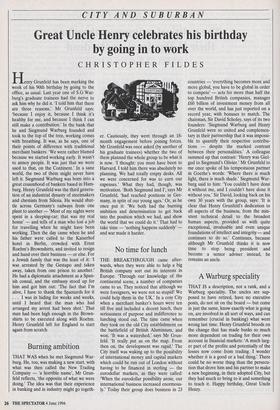No time for lunch
THE BREAKTHROUGH came after- wards, when they were able to help a big British company sort out its interests in Europe: 'Through our knowledge of the continental scene, a number of companies came to us. They noticed that although we were foreigners, we were not so stupid! We could help them in the UK.' In a cosy City when a merchant banker's hours were ten till five and included a decent lunch, their seriousness of purpose and indifference to lunching stood out. The time came when they took on the old City establishment on the battlefield of British Aluminium, and won. 'It was a watershed,' says Mr Grun- feld. 'It really put us on the map. From then on, the development was rapid.' The City itself was waking up to the possibility of international money and capital markets which could be run out of London without having to be financed in sterling — the eurodollar markets, as they were called: `When the eurodollar possibility arose, our international business increased enormous- ly.' Today their group does business in 23 countries — 'everything becomes more and more global, you have to be global in order to compete' — acts for more than half the top hundred British companies, manages £60 billion of investment money from all over the world, and has just reported on a record year, with bonuses to match. The chairman, Sir David Scholey, says of its two founders: 'Siegmund Warburg and Henry Grunfeld were so united and complemen- tary in their partnership that it was impossi- ble to quantify their respective contribu- tions — despite the marked contrast between their personalities.' A colleague summed up that contrast: 'Henry was Giel- gud to Siegmund's Olivier.' Mr Grunfeld to me once spoke of his tempestuous partner in Goethe's words: 'Where there is much light, there is much shade.' Siegmund War- burg said to him: 'You couldn't have done it without me, and I couldn't have done it without you.' Sir David, looking back on his own 30 years with the group, says: 'It is clear that Henry Grunfeld's dedication to all aspects of the business, from the min- utest technical detail to the broadest human aspects, provided us with quite exceptional, invaluable and even unique foundations of intellect and integrity — and continues to do so.' Continues, because although Mr Grunfeld thinks it is now time to stop being president and become a senior adviser instead, he remains an uncle.


























































 Previous page
Previous page